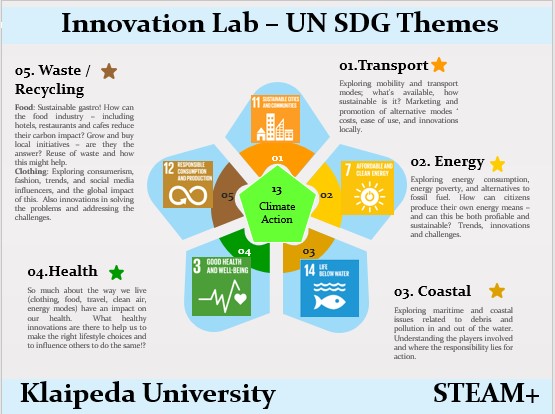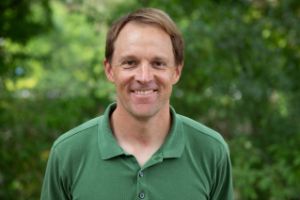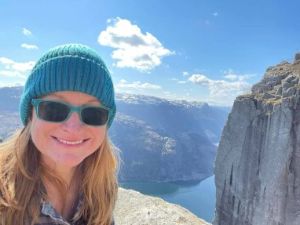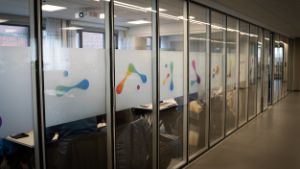Tidligere arrangementer - Side 5
Please join our new digital transdisciplinary lab organized by our Klaipeda University partner. The main topic will be Sustainable Solutions for a Harbour City. We invite 3 to 5 students and one teacher to join our new transdisciplinary lab that will take place online during 22 of November-3 of December. The first 2 days students and teachers will attend lectures from different speakers and after that they will have to choose one or more topics from the picture under, identify such a challenge in the University campus and work together with others in order to find innovative solutions.
While “science practices” are featured heavily in current reform efforts, such efforts do not automatically result in opportunities for students to actively shape science knowledge practices.
When students are denied opportunities to shape science knowledge practices, and receive messages that their ideas, experiences, and communities are unscientific,philosophers name such harm as epistemic injustice.
To disrupt epistemic injustice, I use lenses from fields such as the History and Philosophy of Science to examine how students become transformative epistemic agents in their schools and communities by co-developing science knowledge and practices with teachers.
Teachers hold immense power in classrooms to open up or constrain opportunities for student learning.
While watching teachers enact equitable instruction is wonderful, we know that teachers are not born being able to help all students learn. How, then, can we prepare new teachers to enact equitable instruction?
Here, I will describe teacher educator pedagogies as we design and enact opportunities for preservice teachers to learn about, rehearse, and receive feedback regarding their emerging instruction. I will also describe design-based research conducted with preservice teachers to examine extended opportunities to rehearse equitable instruction in methods courses.
David Stroupe, en av forfatterne av boka Preparing science teachers through practice-based teacher education. Og her betyr ikke «practice» bare/først og fremst skolepraksis, men praksiser – altså ting læreren gjør i klasserommet – som fremmer læring, basert på boka Ambitious science teaching.
In US higher education—and especially the STEM (science, technology, engineering and mathematics) disciplines - women, first-generation college students, and students belonging to certain racial or ethnic groups enter exhibit greater attrition than do their male peers, a gap that continues throughout the professions.
In chemistry, students typically have their first encounter with quantum theory in a dense course covering an extremely broad range of topics to a somewhat shallow degree. Chemists require some knowledge of basic quantum theory, many body theory, time-dependent theory and spectroscopy.
BraketLab is a Python module being developed at the Hylleraas Centre of Quantum Molecular Sciences, which aims to provide a framework where the algebra and logic of quantum theory are automatically enforced, thus allowing the students to freely explore the quantum world and intuitively learn the rules while exploring.
I'll present the module, show some exercises and tutorials, and briefly share some experiences we've gained from teaching with it this semester.
Solving Partial Differential Equations by the Finite Difference Method on a Specialized Processor
LSTM Models Applied on Hydrological Time Series
Mechanical Characteristics and Design of Faceted Silicon Carbide Nanosystems using Molecular Dynamics and Machine Learning
How did two physicists end up working at Norway’s largest bank? Milan completed his PhD in experimental physics at the University of Western Australia in 2007, while Vilde did her master degree in computational physics at the University of Oslo in 2018.
This Wednesdays Karl Henrik will talk about the programming language Julia and exciting things which can be done with this programming language.
Karl Henrik is working on Machine learning applied to quantum mechanical problems for his MSc thesis.
Marcos Caballero: Integrating computation in American high schools - a tale of resourcing, federalism, and equity
Tor Ole Odden: Everything can be a vector! An approach to teaching machine learning to early physics students?
Odd Petter Sand will defend his thesis Integrating Computing with Mathematics and Science Education: Case Studies of Student Understanding and Teaching design for the degree of Philosophiae Doctor.
Joao Inacio is MSc student CS:Physics 1st year. After the seminar we will have pizza.
This week we have the pleasure of having Anne Marthine Rustad and Signe Riemer-Sørensen from SINTEF and the Mathematics and Cybernetics department.
SINTEF is a very important employer in our field of study and we look forward to hear about exciting research and job possibilities. Earlier this semester we forwarded several summer job options from SINTEF.
Philip Sørli Niane is master of Science student in CS:physics, 2nd year. Pizza thereafter and plenty of time for discussions. This is also a topic of interest for potential master of science thesis projects.
Statistics courses typically come in two different flavors:
1) A first type of course seeks deep understanding based on mathematical reasoning and proofs.
2) A second type of course focuses on practical applications, primarily based on fixed recipes without delving into underlying details.
3) I will here propose a third way, which seeks understanding of fundamental concepts, but through programming and simulation instead of mathematical proofs. This third way is thus geared towards students that have a stronger background in programming than mathematics, and that seek to understand the fundamentals as a basis for developing statistical analyses and data science methodology. This third way would also exploit its basis in programming to promote self-driven exploration, drawing inspiration from how computing has been integrated into science education through the long-running CSE initiative. I will provide examples ranging from how to explore the central limit theorem to performing Bayesian marginalization.
In the natural sciences we apply the scientific method in order to uncover the basic rules and principles that govern nature: we make observations, formulate hypotheses, test these hypotheses with experiments and develop theories. Rinse and repeat. But what if you are unable to conduct experiments? Or if the underlying rules suddenly change? These are the difficulties an economists are faced with. In my talk I hope to shed some light on general economic thought and how one goes about modelling “the economic machine” that emerges through human interaction. If the time allow, I will also provide an example of economic cost/benefit analysis done by Menon Economics for the Norwegian Coastal Administration.
Pizza after the seminar.
Hvilke behov og muligheter vi har i Norge for å utvikle tverrfaglige programmer i høyere utdanning? Hvor godt forberedt er Norge til å utvikle og implementere tverrfaglige programmer i høyere utdanning?
Bayesian Analysis of Nuclear Spectra - Investigating Fully Bayesian Unfolding
Industrial research and development are to a great extent the art of extending existing tools and methods with new techniques and data with the objective to optimise and improve operations. Expert Analytics is a Oslo based consultancy working in the fields of data and computational sciences, and in this presentation we will briefly tell you who we are and walk you through a few examples of what we have done for some of our clients. We will also present an internal product development project, where we make sense out of sensors, and where we're planning to open for summer internships next year for help with data exploration.
Stian may also say something about possible master of science thesis projects. He is PhD student.
In this talk, I will briefly describe four different perspectives from the educational research literature on what it means to learn scientific computing: 1) modeling, 2) practices, 3) computational thinking, and 4) computational literacy.
I will also touch on the epistemologies inherent to each theory - what they have to say about scientific knowledge, cite key references, and suggest instructional approaches tailored to each approach.
Using Fault Network Characteristics to Predict Local and Global Damage Accumulation





